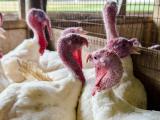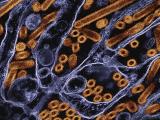Feb 18, 2010
Indonesia phases bird flu commission into zoonosis group
Indonesia's government said today that it would replace its national bird flu commission, set to expire on Mar 13, with a national zoonosis commission, the Jakarta Post reported today. The country's agriculture minister Agus Wiyono said the new commission will work under deputy minister Bayu Krisnamurti, who currently heads Indonesia's bird flu commission, known as the National Commission for Bird Flu Control and Pandemic Influenza Preparedness (Komnas FBPI). Wiyono said officials have received reports of an increasing number of poultry outbreaks over the past 3 months in Java, a pattern he says shows people are more aware of H5N1 avian influenza.
Feb 18 Jakarta Post story
East African countries in talks to bolster H5N1 preparedness
Animal health experts from East Africa and the United Nations are meeting for 3 days this week in Kigali to discuss the region's capacity to prevent and respond to poultry outbreaks of H5N1 avian influenza, AllAfrica news reported today. An official from the East Africa Community (EAC) said commercial poultry production is becoming an attractive revenue producer, but consumers have health concerns, and the virus has been detected in Sudan, which borders some EAC states. He said updated preparedness plans should focus on early detection and early response systems, as well as on measures to improve the public's awareness of risks.
Feb 18 AllAfrica news report
Company develops fridge-free vaccine method
In an effort to improve vaccination, especially in developing countries, a British biotechnology company has devised a cheap and simple way to make vaccines stable, even in warmer climates. The company, Nova Bio-Pharma Technologies, said in a press release yesterday that a scientific report on the process will appear in an upcoming issue of Science Translational Medicine. Many current vaccines require refrigeration or freezing, which means they must be administered in a clinic with a nurse. However, Dr Matt Cottingham, lead author of the study and scientist at Oxford University, said vaccines made with the new technology can be shipped at normal temperatures, which reduces the cost of administration and allows the vaccines to be transported to remote villages. The new technique involves storing virus-based vaccines on sugar-stabilized membranes, which can be kept for a year or longer at 37° C. When healthcare workers need to administer the vaccine, they attach the membrane to a conventional syringe and flush it with liquid. The researchers noted only small losses in vaccine when retrieved from the membrane.
Feb 17 Nova Bio-Pharma press release



















